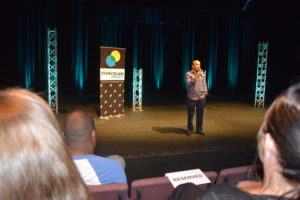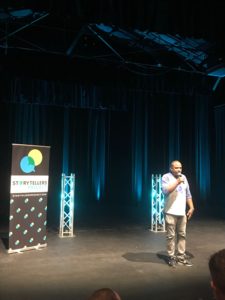I was looking around the crowd at Nashville Storytellers from my seat in the audience. There were so many different types of people there – men in suits, women in scrubs, moms, dads, sisters, kids, senior citizens. I figured we all had one thing in common – and then that assumption was confirmed when the emcee asked, “Who here has been impacted by addiction?” And nearly every person raised their hand.
Nashville Storytellers is an event put on by the Tennessean. In their words, “It puts remarkable people on stage to talk honestly about their lives. Their stories inspire us, connect us, make us laugh – and often they explore life’s most complicated truths.” Topics include “Heroes”, “My 15 minutes of Fame” and this week it was “Addiction.”
As the Public Relations and Marketing Manager for Cumberland Heights I was excited to attend this event because I knew many of the speakers were alumni of our treatment program. On a personal note, I have many friends in recovery, and a father who lost his battle with addiction. This was an especially interesting lineup because those on stage weren’t telling their addiction story, rather, a personal anecdote about a person of experience along the way.
Rob Briley
Ex-State Representative and Cumberland Heights Alumnus, Rob Briley didn’t talk about his failed suicide attempts, relapses or his 2007 DUI arrest that has 41,000 views on Youtube. Instead he talked about his cousin Jeff. Because unlike Rob, Jeff didn’t get a happy ending.
Rob has 10 first cousins and of those 10, seven suffer(ed) from addiction. Jeff was one of them. He was about five years older than Rob and someone Rob always looked up to.
“He was always the person early in my life that I wanted to emulate, that I wanted to be like,” said Rob.

Rob Brilley
The two entered the dark world of addiction together in their teenage years, but also found recovery together years later.
“We learned about living life without alcohol and drugs. We went to meetings together, we read the Big Book together and we stayed sober together. We grew up in recovery,” said Rob.
Both Jeff and Rob had their share of relapses, but on this particular day in 1998 Rob was sober. He had graduated from law school and was clerking for a judge in Nashville when Jeff’s wife called to ask Rob for help. She said Jeff wasn’t doing too well. When Rob arrived at Jeff’s house in Murfreesboro he found his cousin passed out on the couch soaked in his own urine. He was very sick. He had relapsed, began smoking crack and lost his job. Rob was eventually able get Jeff up, they had a long talk over coffee and decided the next day Rob would drive him to Cumberland Heights. But Jeff never made it to Cumberland Heights. That morning he had taken off on one of his kids’ bikes, rode off into the woods and slit his wrists.
“There is not a happy ending to that story. I think the best and only thing you can take from a story like that is a lesson, and the lesson that Jeff taught me was always find room in your heart to forgive yourself. That’s where the healing really begins, and it began for me when I found room in my heart to forgive myself,” said Rob.
Wendell Bigsby
Wendell Bigsby was introduced to drugs by his mother who gave him a joint to smoke when he was nine years old.
“I can remember this like it was yesterday, blowing the smoke out of the first joint and thinking yes, this is it,” said Wendell.
But that euphoric feeling didn’t last. As Wendell got older no drug or drink was ever enough. He would go years jumping from job to job in between binges and eventually found himself at Cumberland Heights.
“When I got there I was scared, afraid and pissed off,” said Wendell.

Wendell Bigsby
Wendell found refuge in the chapel, playing piano and getting lost in the music. Every so often, another guy would come into the chapel. He didn’t look like Wendell or act like Wendell. This man was white and had a long blond ponytail. Wendell was black and had short, dark hair. When the two saw each other, they’d exchange a friendly nod but that was about it. Wendell would continue to see him in the cafeteria, the gym and walking around campus. Finally that man broke the silence by asking Wendell a very important question.
“Do you have a sponsor?”
When Wendell told him no, he would remind him every few days that he needed to get one.
“I didn’t really know anything about recovery. I just wanted to stop hurting,” said Wendell.
Wendell decided he would ask this man who kept bothering him about getting a sponsor to be his sponsor, and to his surprise the man said yes. It blossomed into a beautiful relationship. The two would work on the steps, take walks and constantly check in with each other.
This was during a time when Facebook was all the rage so naturally Wendell decided to look up his sponsor on the social media site.
“Obama was president at the time and he had this big long rant about Obama being Muslim and that his birth certificate was fake,” said Wendell.
Wendell was a little taken aback. These views were completely different from his, but he thought maybe his sponsor was just having a bad day. When he went to check his Facebook a few weeks later Wendell says the posts were even more offensive.
“I was ready to punch him in the throat. He was supposed to get me clean and he’s just judging people.”
Wendell decided he didn’t want a man like that to be his sponsor, but every time Wendell got ready to dump him, his sponsor would show him love and support.
“I was about to let him have it and every time I would get my nerve up, every time I would do it, he would call me 10 minutes before and say, “Hey buddy, what are you doing? Want to take a ride? Or go for a walk?’” said Wendell.
To this day Wendell has never mentioned the offensive Facebook posts.
“My son still calls him ‘Uncle’. He’s just a good dude. He’s different, but we are the same. That’s the thing about addiction. It affects everybody and it will use whatever it can to separate you. It will use your prejudices, your idiosyncrasies, it will use what it has available to separate you from people who will help you because it almost got me.”
Wendell’s sponsor doesn’t have much time left. He’s dying from cancer.
“He is going through some things and now I get to be there for him. I would have missed all of that if I would have listened to that voice,” said Wendell.
Jamie Abner
When Jaime Abner hurt her knee and felt excruciating pain every time she took a step, she decided to just pretend the pain wasn’t there.
“I thought if I just ignored it, it would go away, but that didn’t work. It never works. Keep teaching me the same lesson until I learn it,” said Jamie.

Jaime Abner
On an evening Jamie had dinner plans with her girlfriends, they noticed her limping, and a friend demanded to see the injury up close. Dinner plans quickly turned into a visit to the ER. Doctors told Jamie she had torn her meniscus – that’s a piece of cartilage in your knee that cushions and stabilizes the joint. She would need surgery.
At this point in Jamie’s life she was nine years sober and, in that time, graduated from college, got married and bought a house. The possibility of being prescribed pain meds potentially leading to a relapse terrified her. She worked so hard to get to where she was.
“I love opiates, well I should say loved opiates because of how they made me feel so I was so scared,” said Jamie.
Even when the doctor asked what she was allergic to, Jamie, without missing a beat screamed “opiates!”
But the doctor said she was going to need them. He sat down with both Jamie and her husband, who is also in recovery, and explained the process. She was only getting a week’s worth and Jamie’s husband would be monitoring her use. Even when her husband woke her up in the middle of the night to give her a pill, Jamie refused, saying she didn’t need one. She tried to avoid taking it at all costs, but if she was going to be honest with herself, she knew she needed it. She was in a lot of pain. And with the support of her doctor, husband and everyone in the recovery community Jaime took the pills as prescribed.
She did still end up doing something she always wanted to do, but never did in active addiction.
“I was feeling better and there were three pills left and I remember I flushed them down the toilet. I was done. I was happy about it and it felt good,” said Jamie.
Antwon Bailey
Working on a presidential campaign can be exciting, but the work hours are grueling. Just ask Antwon Bailey.
When he worked on the Obama campaign his days would start at 6:30 AM and usually end around 1:15 AM. Because your entire day consisted of work, it wasn’t uncommon for people to bring a six or 12 pack into the office and enjoy a few beverages at night. Antwon wasn’t one of them. He was living a life in recovery.
“It doesn’t take long before people start asking you why you don’t drink. Well, I’m not evangelical about alcohol. There is nothing wrong with alcohol, but it doesn’t work for me,” said Antwon.
But being around beer and those enjoying it wasn’t Antwon’s biggest problem on the campaign. It was his boss. Antwon didn’t feel like she was much of a leader and that team members below her were picking up her slack. So Antwon took his grievances up the chain to his boss’s boss, Sean, and begged him to make some changes. Sean was never very committal or emotional. He just always told Antwon to hang in there.

Antwon Bailey
“You never really knew where you stood with the guy,” said Antwon.
Antwon tried to quit twice, but Sean, always told him to stick around. It was frustrating to Antwon because if Sean really thought he was an asset to the team he never showed it.
“We won the election. Sean kept being weird and non-descript and unemotional and then everyone went back to their world doing whatever they wanted to do,” said Antwon.
Several months down the road, Antwon, who lived in Nashville, shared on Facebook that he would be back in Chicago for a few days. Sean saw the post and asked Antwon to meet him for dinner.
“He was super cryptic,” said Antwon.
Antwon agreed, and when he arrived at the restaurant, Sean was already there. Antwon sat down and ordered a soda with lime and sees Sean has the same thing. They look at each other a little awkwardly and then Sean says this:
“So, listen. You know you’re always just a cool dude so I just thought I’d tell you, you know you were never drinking on the campaign and you were never a jerk about it. You were just cool. So shortly thereafter I thought I’d be cool too. No booze for me.”
Antwon asks, “Are you an alcoholic?”
Sean responds, “I don’t know. I just thought for now no alcohol and since you were in town I wanted to thank you for helping me do that.”
Antwon wasn’t sure what he had done to help Sean in his journey, but he congratulated him and the two didn’t see each other again until Obama’s term was up. There was a party for all of those connected to the campaign in Chicago and both Sean and Antwon were there.
Sean approaches Antwon with his mother, introducing him as “the guy I told you about who had an incredible impact on my life.”
Antwon had no idea he did this for Sean. He just assumed Sean was a socially awkward guy who wasn’t passionate about much. But he was wrong.
Even now, whenever Antwon celebrates a recovery birthday on Facebook he’ll hear from Sean. For example, Antwon will simply post the number “9” for nine years sober. And then he’ll get a private message from Sean with his number “1.” And the next year, Antwon will post “10” and he’ll get a message from Sean that reads “2”
“I don’t know what he’s doing but he’s doing it and he wants to make sure that I know about it, so politics aside, the craziest things happen in the craziest of places,” said Antwon.
These were four very different stories from four very different people. Often, when you hear recovering addicts speak, you learn about their lowest of lows and the steps they took to find long-term recovery. But just like in any journey, there are experiences and people along the way that stick with you – experiences and people you may have believed at the time were insignificant. But these short stories matter , because they make up the fabric of who we are.










